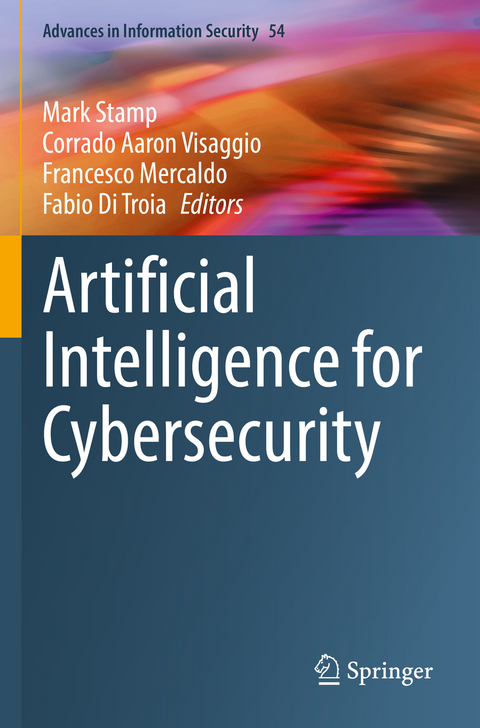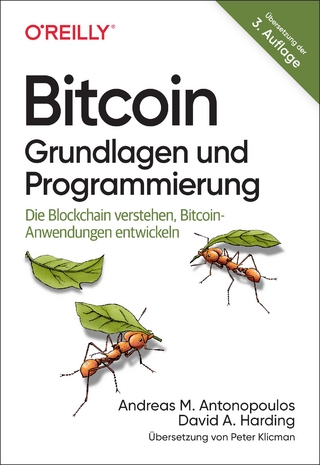
Artificial Intelligence for Cybersecurity
Springer International Publishing (Verlag)
978-3-030-97089-5 (ISBN)
This book explores new and novel applications of machine learning, deep learning, and artificial intelligence that are related to major challenges in the field of cybersecurity. The provided research goes beyond simply applying AI techniques to datasets and instead delves into deeper issues that arise at the interface between deep learning and cybersecurity.
This book also provides insight into the difficult "how" and "why" questions that arise in AI within the security domain. For example, this book includes chapters covering "explainable AI", "adversarial learning", "resilient AI", and a wide variety of related topics. It's not limited to any specific cybersecurity subtopics and the chapters touch upon a wide range of cybersecurity domains, ranging from malware to biometrics and more.
Researchers and advanced level students working and studying in the fields of cybersecurity (equivalently, information security) or artificial intelligence (including deep learning, machine learning, big data, and related fields) will want to purchase this book as a reference. Practitioners working within these fields will also be interested in purchasing this book.
lt;p>Mark Stamp has extensive experience in information security and machine learning, having worked in these fields within academic, industrial, and government environments. After completing his PhD research in cryptography at Texas Tech University, he spent more than seven years as a cryptanalyst with the United States National Security Agency (NSA), followed by two years developing a security product for a Silicon Valley start-up company. Since early in the present century, Dr. Stamp has been employed as a Professor in the Department of Computer Science at San Jose State University, where he teaches courses in machine learning and information security. To date, he has published more than 150 research articles, most of which deal with problems at the interface between machine learning and information security. Dr. Stamp served as a co-editor of the Handbook of Information and Communication Security (Springer, 2010) and Malware Analysis using Artificial Intelligence and Deep Learning (Springer 2020), and he is the author of multiple textbooks, including Information Security: Principles and Practice (Wiley, 3rd edition, 2021) and Introduction to Machine Learning with Applications in Information Security (Chapman and Hall/CRC, 2nd edition, 2022).
Corrado Aaron Visaggio is an associate professor at the Department of Engineering of the University of Sannio, where he teaches "Security of Networks and Software Systems" at the MSc in Computer Engineering. Currently he is also Chief Scientist Officer at Defence Tech, a company operating in Cybersecurity, Aerospace and Military Engineering. He obtained the MSc in Electronic Engineering (2001) from Politecnico di Bari, and the PhD in Information Engineering (2005) from University of Sannio. His main research interests are: malware analysis, data protection, data protection, threat intelligence. He teaches in Master Programs of Cybersecurity of University of Rome "Tor Vergata", and the International School against organized crime organized by the Italian Ministry of Interior for the education of International Law Enforcement Agencies, and has been instructor at the Department of Intelligence, at the Italian Ministry of Interior. He is director of the Unisannio Chapter of the CINI Cybersecurity National Lab. He is in the Organizing Board of CINI Cybersecurity National Lab. He leads the Cybersecurity Lab at the Department of Engineering of University of Sannio. He is the scientific leader of several research projects in Cybersecurity, funded by Private and Public Organizations. He collaborates with several Universities (ETH Zurich, University of San Jose, University of Castilla-La-Mancha, University of Lugano, University College Dublin, University of Delft, Cochin University of Science & Technology and SCMS School of Engineering & Technology). He has authored more than one hundred scientific papers and he serves in the Editorial Boards of International journals and Program Committees of international Conferences. He is among the founders of the SER&Practice software house, and SLIMER software House.
Fabio Di Troia is an Assistant Professor in the Computer Science department at San Jose State University, where he teaches information security and machine learning courses. He completed his PhD in computer science at Kingston University, London, researching applications of machine learning in the field of cybersecurity. His areas of focus are malware detection, malware design, cryptology, biometrics, and access control. In collaboration with colleagues sharing similar academic background, he co-founded the Silicon Valley Cybersecurity Institute (SVCSI) in 2019, a non-profit organization that aims to increase awareness in the cybersecurity domain for high-school, undergraduate, and graduate students, with particular emphasis
Part I: Malware-Related Topics.- Generation of Adversarial Malware and Benign Examples using Reinforcement Learning.- Auxiliary-Classifier GAN for Malware Analysis.- Assessing the Robustness of an Image-based Malware Classifier with Small Level Perturbations Techniques.- Detecting Botnets Through Deep Learning and Network Flow Analysis.- Interpretability of Machine Learning-Based Results of Malware Detection Using a Set of Rules.- Mobile Malware Detection using Consortium Blockchain.- BERT for Malware Classification.- Machine Learning for Malware Evolution Detection.- Part II: Other Security Topics.- Gambling for Success: The Lottery Ticket Hypothesis in Deep Learning-based Side-channel Analysis.- Evaluating Deep Learning Models and Adversarial Attacks on Accelerometer-Based Gesture Authentication.- Clickbait Detection for YouTube Videos.- Survivability Using Artificial Intelligence Assisted Cyber Risk Warning.- Machine Learning and Deep Learning for Fixed-Text Keystroke Dynamics.- Machine Learning-Based Analysis of Free-Text Keystroke Dynamic.- Free-Text Keystroke Dynamics for User Authentication.
| Erscheinungsdatum | 18.07.2023 |
|---|---|
| Reihe/Serie | Advances in Information Security |
| Zusatzinfo | XVI, 380 p. 184 illus., 155 illus. in color. |
| Verlagsort | Cham |
| Sprache | englisch |
| Maße | 155 x 235 mm |
| Gewicht | 611 g |
| Themenwelt | Informatik ► Netzwerke ► Sicherheit / Firewall |
| Informatik ► Theorie / Studium ► Künstliche Intelligenz / Robotik | |
| Schlagworte | Adversarial Learning • Artificial Intelligence • Bert • Biometric • Blockchain • Botnet • Clickbait • convolutional neural network (CNN) • cybersecurity • Deep learning • Explainable AI • Generative Adversarial Network (GAN) • Hidden Markov Model (HMM) • Information Security • interpretable AI • keystroke dynamics • machine learning • Malware • resilient AI • survivable AI |
| ISBN-10 | 3-030-97089-2 / 3030970892 |
| ISBN-13 | 978-3-030-97089-5 / 9783030970895 |
| Zustand | Neuware |
| Informationen gemäß Produktsicherheitsverordnung (GPSR) | |
| Haben Sie eine Frage zum Produkt? |
aus dem Bereich


